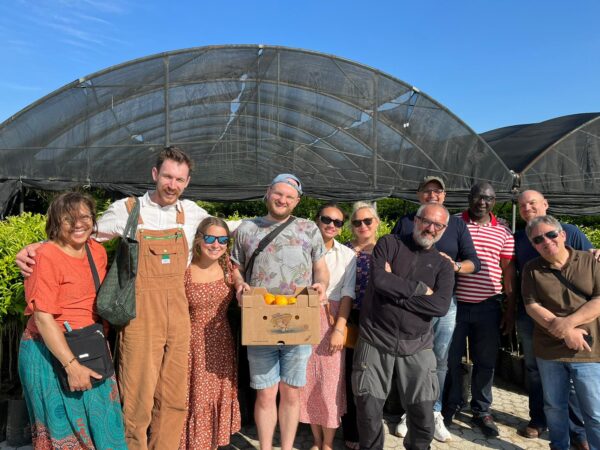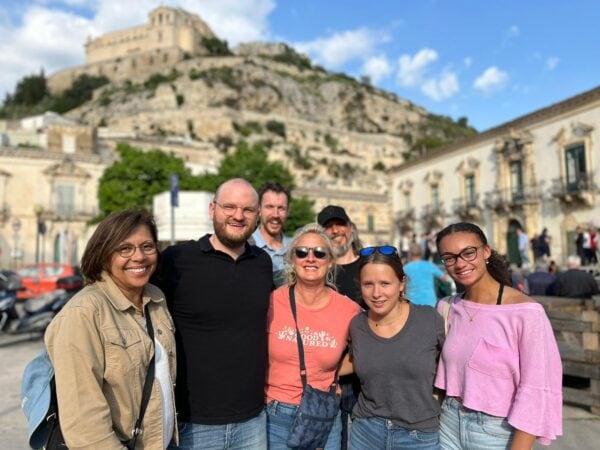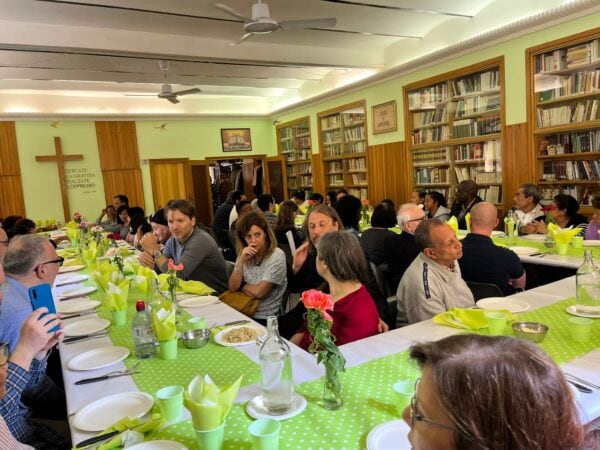First Baptist Ashland encourages the work of Italian Baptists with refugees
In May of 2023, a team of six members from First Baptist Church of Ashland Virginia (FBCA) visited Italy to learn about and support the work of Italian Baptists with refugees and migrants. Having become involved in refugee work of their own in Ashland a few years ago, the FBCA team went to connect, reflect, and encourage the Italians in their own work. They traced the journey of refugees and migrants backwards, starting with those who have settled in Rome, to those working in agriculture in Calabria, and finally to Sicily where many arrive in Italy for the first time. Along the way, they experienced for themselves how the Baptists of Italy, in partnership with other small Protestant groups, take the business of loving their neighbor very seriously.

Visiting the social agricultural project SOS Rosarno in Calabria
The team experienced Rome through the eyes of Ivano de Gasperis, a Baptist pastor and evangelist who co-pastors with his wife Antonella in the quaint Roman neighborhood of Trastevere. Much of our time in Rome was walking in the wake of Ivano’s infectious love for the people around him and meeting those who he has ministered with and alongside the past 15 years in Rome–
A homeless man on the street outside of his church, whom Ivano didn’t hesitate to pray with and give bread to. Sister Adrianne, a Catholic nun who has poured out her life to partner with a team of community organizations to re-enliven an old government building into a community center, housing project for refugees and homeless people and a place where refugees can learn trades. Samuel, a former refugee from Nigeria who now has settled into a new life in Rome. Ali, an Afghan refugee whose wife was a prominent feminist advocate in Kabul and who lived at the Trastevere church for a year. And the congregation of the church, itself a hodge podge of formerly homeless people, migrants from Latin America, and families whom Antonella and Ivano have faithfully ministered with for 15 years. These were just some of the people whom Ivano and the church have loved as their neighbor and who they are partnering with in the community for Kingdom work.
The team also met those working with Mediterranean Hope, a joint project of the Federation of Protestant Churches in Italy. From working toward humanitarian corridors for refugees to safely come to Italy, to running a center for refugees in Bosnia, and working across Italy with refugees and migrants, Mediterranean Hope is providing excellent, professional care and advocacy for refugees in the country. The team experienced multiple Mediterranean Hope projects across the country, visiting two in the south of Italy.
Calabria, the region on the toe of Italy’s boot, is one of the fruit baskets of Europe, where much of its citrus is grown. Many of those who come to Italy to seek asylum end up working in the fruit orchards in this region, becoming trapped in a system of exploitation. They work long and brutal hours for little pay– many of the farmers are beholden to local mafia groups and with the economic conditions, sell their produce at extremely low prices. Many of the workers live in remote shanty towns with little access to water or electricity. Multiple European Union projects have been undertaken to try and provide housing and some were completed, but local government corruption has kept them shut.

The team together in the town of Scicli, Sicily
The team visited one such EU project with leaders from Mediterranean Hope, a brand new camp with housing units, recreation areas, and even solar powered energy. But its gates are shut and there is no word of how long it will take before it will open. In the meantime the workers live in a large shanty town of tarps, tents, and camp fires just across the field from the new camp. Yet even if the camp were to open, it is in a remote part of the countryside, miles away from any other infrastructure or major towns, is fenced in, and equipped with many security cameras. Even living there would be like a prison for those trapped here.
Mediterranean Hope is working to find a way to see people who are pushed to the margins and forgotten in the wilderness. In Rosarno, they work with two projects– one called Dambe So, or the House of Dignity, and the other called SOS Rosarno. Dambe So provides stable housing for migrant workers as well as opening up places for tourists to come visit the area in the off-season. SOS Rosarno is an ethical farm cooperative where organic fruit is grown, workers paid a fair wage, and where people are lifted out of poverty and freed from indebtedness to crime families. Churches in Germany help create an economy of fairness, paying a higher price for the produce in solidarity with the project. Both projects seek to break the cycle of exploitation and restore dignity to those stuck in difficult circumstances.
Before heading to Sicily, the team enjoyed the hospitality of the International Evangelical Church of Reggio Calabria, pastored by Nunzio Loiudice. The church is still recovering from the isolation of Covid and is a mix of international people mostly from the Philippines and local Italian people. Nunzio has a heart not only for his local multi-cultural church, but for the refugees and migrants in the area. He is looking to start a ministry addressing the spiritual needs of those in shanty towns in the area. His care and hospitality mirrored that of all of our hosts, which Tom Lynch, the Pastor of Missions and Discipleship at FBCA commented, “The generosity of the Baptist churches we met and spent time with was an echo of God’s generosity.”
As the team made its way to Sicily, it was able to go all the way to the Southern coast, where many refugees and migrants first arrive in Italy after harrowing journeys. In fact, the team stood near the beach where in 2013, 13 people died in a few inches of water, weighed down by layers of wet clothes and exhaustion after a harrowing journey across the sea. They held a vigil for those 13 people as well as all others who have died in transit on their way to Europe since. Looking over the waves, toward the North African coast, they repeated the words, “Lord have mercy, Christ have mercy.” After a moment of prayer, they dropped rocks into the waves, representing just some of the lives who did not make it to safety.
Then the team went to meet those who had made it safely and who were in the care of Mediterranean Hope in the town of Scicli. Mediterranean Hope in conjunction with local churches runs the Casa Delle Culture, a multipurpose building with apartments for refugee families and a center for community projects and events that connect refugees with resources to integrate into the city. There they spent time with the kids of those who live in the center, teaching them “heads, shoulders, knees, and toes” before making beaded bracelets. The joy and liveliness of the kids perfectly showcased the resilience and strength of those who have experienced displacement, giving a glimmer of hope in desperate situations.
On the last portion of the trip, the team learned from the hospitality and tenacity of the small Baptist church in Catania, Sicily. The church supports the work of the “Mustard Seed Project”, a small housing project that hosts young men who are refugees and migrants predominately from West Africa. They provide housing and support in job training to men who are nearing the age where they stop receiving underage support from the government and become extremely vulnerable to exploitation from illegal work schemes.
The team was able to share a joint meal with some of the residents of the apartments along with leaders from the church. As we enjoyed food together, it was clear this was not just a ministry project but a beautiful extended family sharing a meal together. The young men passed around the young children of Silvia Rapisarda, the pastor of the church, and laughed together with the church leaders. The team was able to use Google translate, broken English, and the universal love of soccer to connect with the young men. One man reflected to the team, “Silvia, she is like my mother. She saved me and she is my family.” It was a gift to be invited to this family table.

The team eating a fellowship meal with the church of Trastevere in Rome
In addition to working with the Mustard Seed House, the church hosts an Italian language school which focuses on helping teach and integrate migrants, refugees, and others into the community. The team joined in with students to learn basic Italian and learn from the expert volunteers on how to engage with new language learners. Kara Arruzza, a member of the team who also teaches ESOL class at FBCA was thrilled at some of the lessons they learned during this time and the larger mission behind it. She reflected, “it was so good for me to experience the world, to see the very real refugee crisis and all the people obeying God in their love of others. This challenged me to do the same– to be close enough to God to let Him work through me, love through me.”
In the midst of this challenging landscape, the Baptists continue to minister, continue to look out for those on the margins, and care for those in need in their community. Rose Mary, another team member, reflected on the incredible ministry that the small band of Baptists in Italy are able to engage with despite limited resources, “God can do so much more through us than we ever imagined when we say “yes” to being on mission with Him and avail ourselves to Him.”
The trip was a rich time of exchange, mutual learning, and worship. From shared meals to worship services and informal conversations, the team were able to reflect with Italian brothers and sisters on the challenges of refugee ministry in dynamic contexts. Though the contexts are very different, many of the challenges remain the same, especially for displaced peoples who seek safety in Italy or the US. The team from FBCA returned inspired and encouraged to continue on in their own work in Virginia and to help galvanize other churches to get involved in refugee ministry.
To learn more about this ministry contact Craig Waddell.
